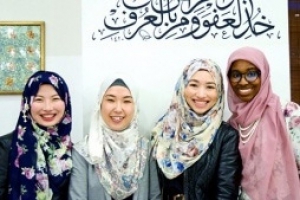A group of Muslim women living in Japan is trying to counter this prejudice by explaining that women across the Islamic world appear in public dressed that way simply to protect their modesty.
In a separate effort, a group of Muslim women in Japan is working to promote hijab and other clothing for Muslims as fashionable items. By creating interest, they hope to enhance exchanges between Japanese and followers of Islam.
In late January, about 100 people gathered at Tokyo Camii, one of the biggest mosques in Japan and located in the capital’s Shibuya Ward, to try on the traditional hijab scarf.
Wrapping colorful scarves around their head and pinning them up, women who participated in the "A Day in Hijab” event looked into a mirror and chirped "wonderful” and "so cute.”
"In our religion, hiding all parts of the body except the face and hands is tantamount to a command from God,” a Muslim woman from Morocco told the participants. "So wearing hijab is a sort of worship for us. When we don the veil, we can feel confident in ourselves and being respected by others.”
The event was organized by four Muslim women in their 20s and 30s who live in Japan.
One of them, 23-year-old Arisa Sakamoto, works for a company in Tokyo. She wore a black scarf with a floral pattern for the event. Sakamoto said she had often dressed skimpily--wearing shorts, for example--until she embraced Islam.
Sakamoto converted while she was a senior at university and studying Malay. Sakamoto said she was attracted to Islam by its principles of tolerance and maintaining a positive attitude in the face of adversity.
Although she yearned to wear hijab to "show people that I am a Muslim,” her parents initially talked her out of it in the belief she could be targeted for abuse and prejudice.
But after watching her daughter dutifully practice her faith, by actively helping her parents with the housework and showing them respect, her mother came to think otherwise. She now helps the daughter select clothing that matches hijab.
When she wears hijab outdoors, Sakamoto said she is sometimes approached by fellow Muslims. Even elderly Japanese have praised her veil as "beautiful.”
However, Sakamoto does not wear hijab at work.
"I want to wear hijab there, but that is still difficult as there are few Muslims,” said Sakamoto, who joined the company a year ago. "I think the first thing I need to do is to promote an understanding of Islam there through my own actions.”
A growing number of non-Muslim Japanese have recently shown interest in Islamic fashion. In fact, non-Muslims accounted for half of the participants in the A Day in Hijab event.
Ayano Oki, a 22-year-old university student from Mitaka, western Tokyo, said she learned about the event through Facebook and attended with a friend.
"I used to believe that Muslim women are forced (to wear hijab), so I was surprised to find out that it is a matter of personal choice,” said Oki. "The event was a good opportunity for me (to learn about Islam) as I have no Muslim friends.”
Another of the organizers, Okamoto Amna Balouch, 22, was surprised by the amount of interest in the event and that so many people wanted to learn more about Islam.
"Those in hijab are not oppressed or forced, and they are just the same as other women filled with hopes and dreams,” Okamoto said. "I believe the participants understood that point.”
In the meantime, a group of Japanese is trying to promote Muslim clothing as fashionable gear.
Shinichi Orita, 37, a former high school teacher who is now studying at the graduate school of Keio University, established the Japan Muslim Fashion Association in April last year.
The association supports Japanese companies that create Muslim clothing based on kimono, silk and other traditional Japanese materials, and introduces their products to the Islamic world.
Orita used to teach commercial subjects at high schools on Amami-Oshima island in Kagoshima Prefecture and elsewhere, and felt uncomfortable about other teachers’ lack of understanding of Muslim students.
As part of his research at the graduate school, Orita visited Indonesia, where nearly 90 percent of the population are Muslim, and thought there that Japan has to "provide education programs that can respond to globalization.”
Orita is currently proposing developing new products by combining Japan’s traditional fabrics and Islamic clothes.
"In the future, I want to bring business practices into the educational field to enhance understanding of Muslims among Japanese,” he said.


















